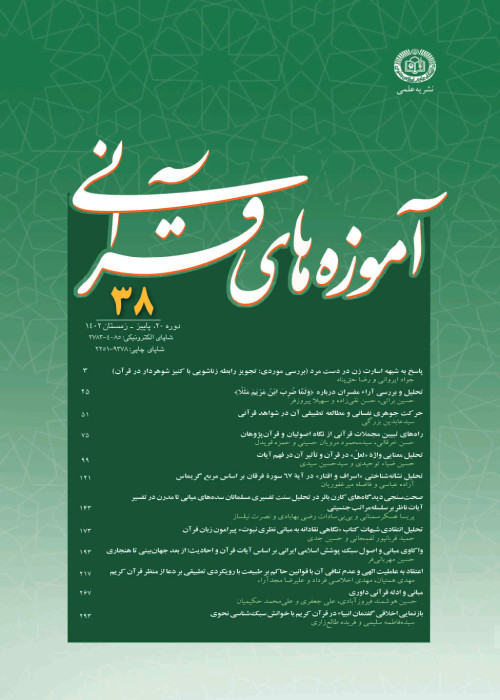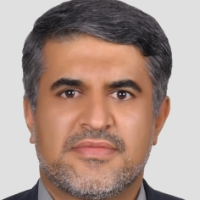The Examination of the Exegetical and Quranic Principles of Muhammad Amin Astarabadi and the Critique of Them
Author(s):
Article Type:
Research/Original Article (دارای رتبه معتبر)
Abstract:
Muhammad Amin Astarabadi is one of the famous scholar of Imamiyyah in 11th A. H. Muhammad Amin has codified his teachings in a book titled “al_Fawa'id al_Madaniyya” which is a prominent work among his works. He has special principles and specific Quranic and Exegetical thoughts. This note has investigated and identified and criticized them with analytic- descriptive method and has achieved the below results Astarabadi believes that the only way to achieve well-being is employing (resort to) the hadiths of the Infallibles (Ma'sūmūn). He believes that the main addressee of the holy Quran is the Infallibles and he thinks every exegesis of the holy Quran except the exegeses of the Infallibles is Tafsīr bi-Ra'y (the commentator accepts and believes the certainty of opinions and attitudes as incredible presuppositions then he interprets the Quran according to his own desire to prove them) and negates the apparent s meaning of the Quran verses (hujjiyat al_zawahir) in the theoretical ordinance He also believes that ijmae (consensus) and aql (intellect) are not appropriate. for being used as reasons and proofs. Astarabadi believes that the Quran includes all knowledge and also the distortion (tahrif) in the Qur'an is possible. There are serious critiques about these beliefs which are: achieving salvation and well-being of man is resorting to the holy Quran and the Infallibles (Thaqalayn literally meaning: holding the Quran and two weighty things) together. The assignment of the comprehension and understanding of the holy Quran to Shia imams has in opposition with being the holy Quran a miracle and the challenge of the noble Quran. Although, the profound and careful understanding of the Quran assigns to Imams but there is no proof for the negation of its absolute perception by non-Infallibles. The apparent meaning of the Quran verses which are not authentic is in contradiction with the verses encouraging thinking and contemplation. The exegesis of the holy Quran according to the criteria and conditions is possible and necessary and it is not considered Tafsīr bi-Ra'y (the commentator accepts and believes the certainty of opinions and attitudes as incredible presuppositions then he interprets the Quran according to his own desire to prove them). The comprehensiveness of the noble Quran does not mean the absolute comprehensiveness but it means the comprehensiveness in the religion and guidance. Because of the verse which states that holy Quran protected from any alteration and distortion and no-entrance of batil (falsehood), the holy Quran has never been distorted verbally.
Language:
Persian
Published:
مجله آموزه های قرآنی, Volume:16 Issue: 29, 2019
Pages:
305 to 328
magiran.com/p1995721
دانلود و مطالعه متن این مقاله با یکی از روشهای زیر امکان پذیر است:
اشتراک شخصی
با عضویت و پرداخت آنلاین حق اشتراک یکساله به مبلغ 1,390,000ريال میتوانید 70 عنوان مطلب دانلود کنید!
اشتراک سازمانی
به کتابخانه دانشگاه یا محل کار خود پیشنهاد کنید تا اشتراک سازمانی این پایگاه را برای دسترسی نامحدود همه کاربران به متن مطالب تهیه نمایند!
توجه!
- حق عضویت دریافتی صرف حمایت از نشریات عضو و نگهداری، تکمیل و توسعه مگیران میشود.
- پرداخت حق اشتراک و دانلود مقالات اجازه بازنشر آن در سایر رسانههای چاپی و دیجیتال را به کاربر نمیدهد.
دسترسی سراسری کاربران دانشگاه پیام نور!
اعضای هیئت علمی و دانشجویان دانشگاه پیام نور در سراسر کشور، در صورت ثبت نام با ایمیل دانشگاهی، تا پایان فروردین ماه 1403 به مقالات سایت دسترسی خواهند داشت!
In order to view content subscription is required
Personal subscription
Subscribe magiran.com for 70 € euros via PayPal and download 70 articles during a year.
Organization subscription
Please contact us to subscribe your university or library for unlimited access!



